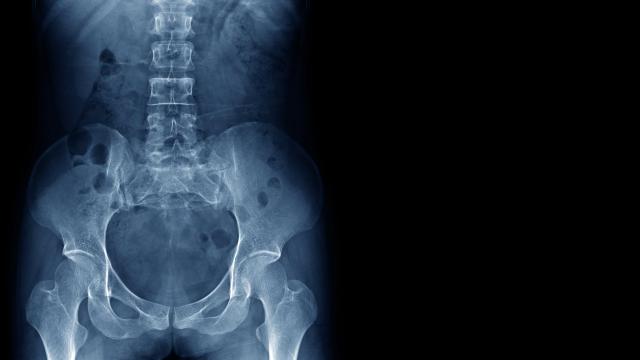A team of scientists say they may have found a new way to mitigate one of the most dangerous complications of space travel: the steady and inevitable loss of bone mass. In new research published this week, the team’s experimental treatment was able to promote bone growth in mice living aboard the International Space Station for at least nine weeks, seemingly with no adverse effects. More study will be needed to validate this treatment before it can be used in humans, however.
Fun as being nearly weightless might seem, the microgravity environment of space can have profoundly negative effects on our bodies if we stay up there too long. Our bones in particular actually depend on regular mechanical stress to stay healthy, much of which comes from fighting against Earth’s gravity. Without this stress, the body’s production of bone-building cells (called osteoblasts) starts to slow down. Coupled with the constant wearing down of our bones, this leads to progressive bone loss, which can then raise the risk of fractures during the mission and possibly even later on in life. Astronauts can lose up to 1% of their bone mass for every month they spend in space, while recovery back on Earth can take years following a long trip.
Astronauts will exercise for hours a day in space to stave off bone loss, but it’s a time-consuming and imperfect stopgap. So finding a safe and highly effective workaround to this problem is almost certainly essential to making long-term space travel a practical reality for humanity at large. Researchers at the University of California at Los Angeles (UCLA) and the Forsyth Institute in Cambridge, Massachusetts believe they’re now one major step closer to that goal.
Their earlier work had shown that a particular molecule called NELL-like molecule-1 (NELL-1) plays a crucial role in helping us develop and maintain bone density. They then created a version of NELL-1 that could stay in the body longer without losing its effect, an important consideration for space travel given how busy astronauts can be during a mission. Lastly, they combined their NELL-1 with bisphosphonate—a class of drugs already used to prevent bone loss—in order to better target bone tissue and hopefully avoid the side effects seen with typical bisphosphonate use.
They then tested their treatment on both space-bound and land-dwelling mice, comparing them to controls. Some of the space mice only went up to the ISS for four-and-a-half weeks and returned back to Earth, while the rest stayed and were observed for nine weeks. Those on Earth enjoyed a stay at the Kennedy Space Center. By the end of the experiment, all of the treated mice showed signs of bone growth “without obvious adverse health effects,” according to the authors.
The team’s results, published Monday in the journal Microgravity, are only the start of showing that this treatment can work as intended. And it will take more data to truly confirm the drug’s long-term safety and effectiveness. However, the authors are excited by the implications of their research and what it could mean for space travel.
“Our findings hold tremendous promise for the future of space exploration, particularly for missions involving extended stays in microgravity,” said lead corresponding author Chia Soo in a statement from UCLA.
Ideally, this treatment could even have other practical uses, the authors note. There are plenty of medical conditions on Earth that sap away our bone strength, such as severe osteoporosis. And it’s not far-fetched to hope that the team’s molecule could help prevent musculoskeletal deterioration more generally.
For now, the team is still analysing the data from the mice that returned back to Earth—a feat in itself, since it was the first ever live animal return (“LAR Flight”) of mice accomplished by U.S. scientists.
